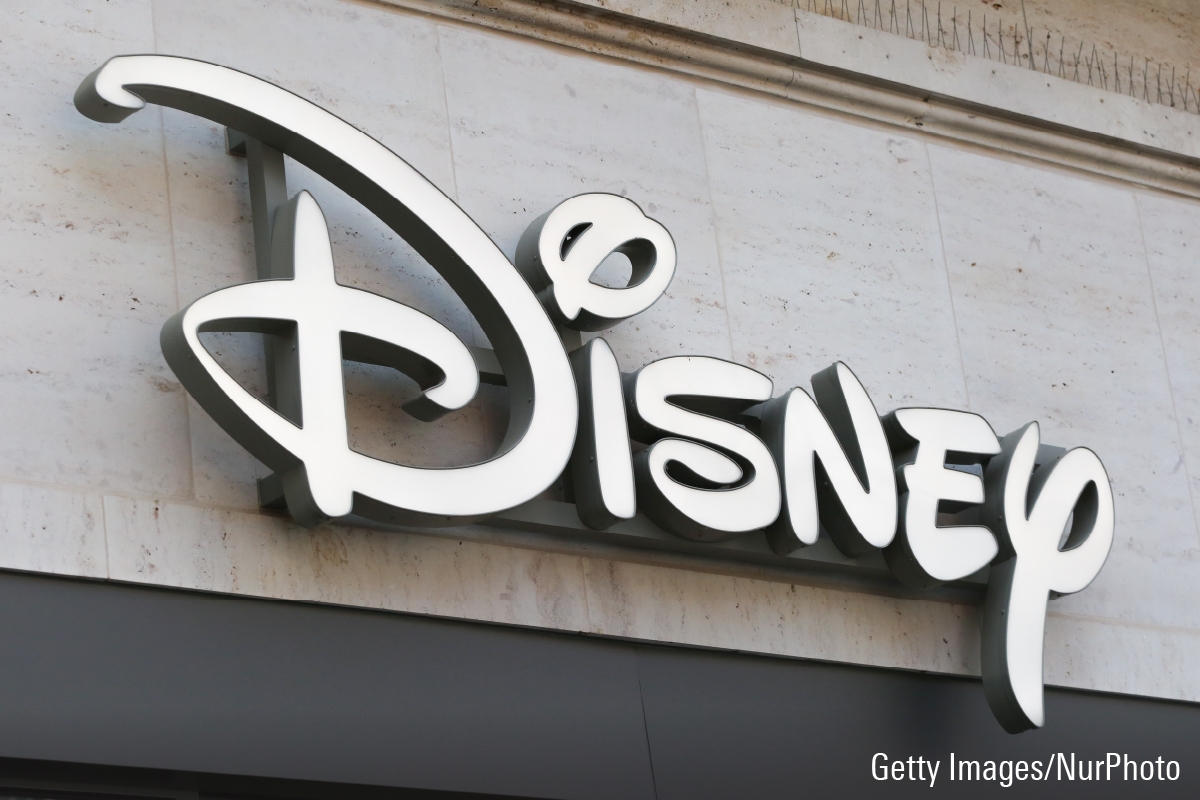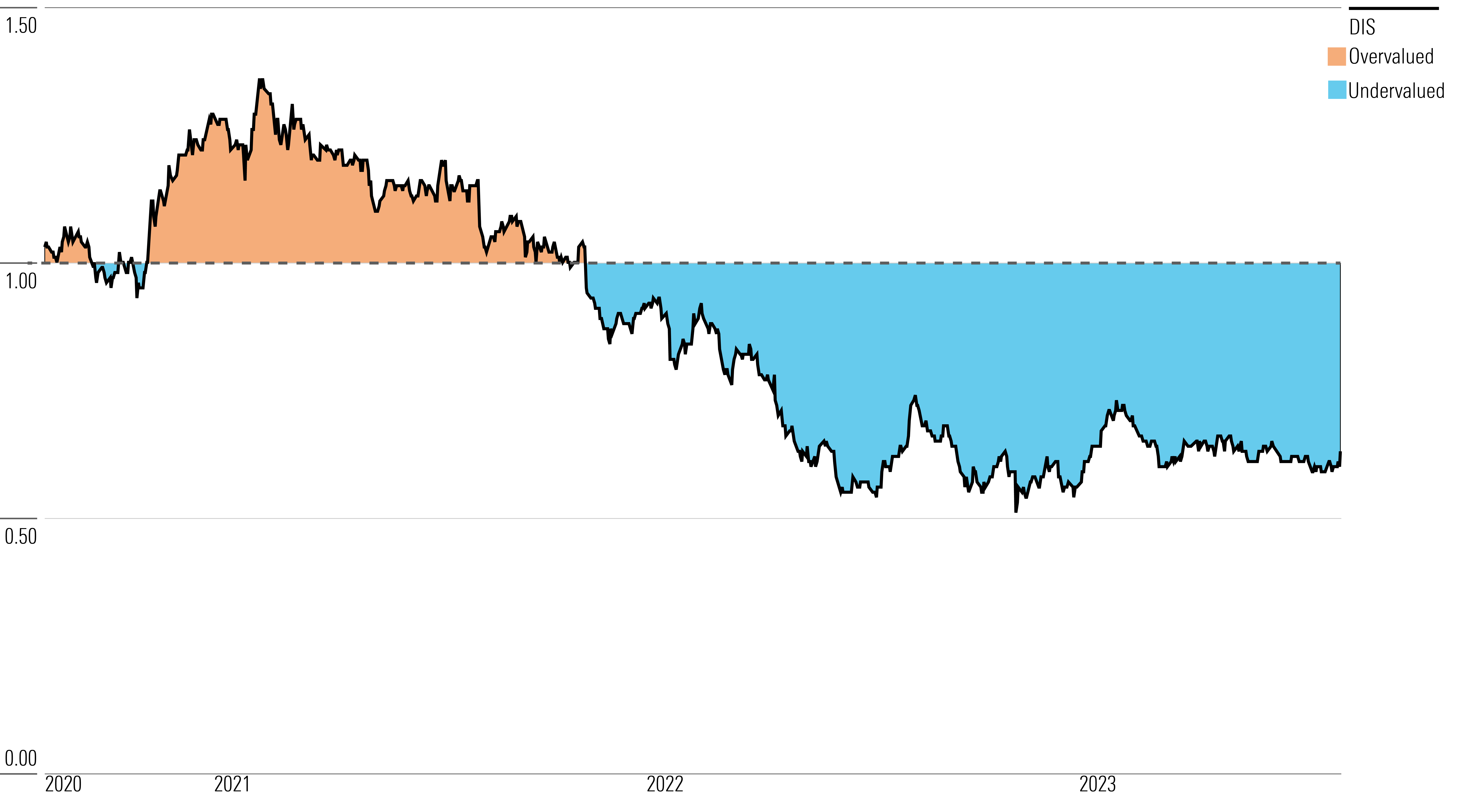After Earnings, Is Disney Stock a Buy, Sell, or Fairly Valued?
Losses shrank, but subscriber growth will be important going forward.

The Walt Disney Company DIS released its third-quarter and nine-month earnings report on Aug. 9 after the close of trading. Here’s Morningstar’s take on Disney’s earnings and stock.
Key Morningstar Metrics for Disney
- Fair Value Estimate: $145
- Morningstar Rating: 4 stars
- Morningstar Economic Moat Rating: Wide
- Morningstar Uncertainty Rating: High
What We Thought of Disney’s Q3 Earnings
Revenue improvement: Disney posted a solid fiscal third quarter, as streaming losses continued to shrink but Disney+ and Hulu delivered very weak subscriber numbers. Total revenue improved by 4% year over year to $22.3 billion, as the growth at parks and direct-to-consumer outweighed the declines at the linear networks and studios businesses
More subscriber growth needed from streaming: Even as the streaming segment remains on course to break even by the end of fiscal 2024, we still believe Disney needs to drive stronger top-line growth to replace declining linear networks revenue. While the just-announced price increases are one lever for driving revenue growth, we think subscriber growth will also be required over the medium term.
Disney Stock Price
Fair Value Estimate for Disney
With its 4-star rating, we believe Disney’s stock is undervalued compared with our long-term fair value estimate.
Our updated $145 fair value estimate for Disney (lowered from $155 in May) reflects slower subscriber growth and lower losses from streaming. We expect average annual top-line growth of 6% through fiscal 2027. We now project losses for the streaming segment to continue through fiscal 2024, for linear advertising to decline over the next five years, and for a continued decline in linear networks margins.
We expect that fiscal 2023 admissions revenue will remain ahead of fiscal 2019, despite consumer worries about the economy and inflation. We project that merchandise, food, and beverage revenue will see similar growth, as will resorts revenue. The parks and consumer segment suffered a 37% decline in revenue in fiscal 2020 and a 3% decline in fiscal 2021. Following a strong bounce back of 73% in 2022, we expect more normalized growth of 5% over the next five years.
We estimate 12% average annual growth for the direct-to-consumer segment, as we are modeling strong subscriber growth for Disney+ and Hulu, along with further price increases. We now project that Disney-branded streaming services will hit 235 million paid subscribers by the end of fiscal 2027. This growth assumes a continued international rollout and improved penetration in the larger Western markets. We project that the segment will post its first positive annual operating income in fiscal 2025.
Read more about Disney’s fair value estimate.
Disney Price/Fair Value

Economic Moat Rating
We assign Disney a wide economic moat. Its media networks segment and collection of Disney-branded businesses have demonstrated strong pricing power over the past decade. We believe that the assets brought on by the firm’s acquisition of 20th Century Fox in 2019 will continue to help it generate excess returns on capital despite the increasingly competitive media marketplace, including within the streaming landscape.
Despite changes in consumer behavior, the company’s pay-television penetration remains above 60% of U.S. households. Disney networks remain important pieces in the traditional pay-TV bundle. While cord-cutting remains an ongoing issue, premier cable networks like ESPN and FX still generate significant cash flows from both affiliate fees and advertising, with price increases historically outpacing customer losses. The firm’s roster of networks provides distributors with general entertainment, live sports at ESPN, and news coverage at ABC—two genres keeping many subscribers in the pay-TV universe. While we expect pay-TV subscribers to continue to decline annually, the underlying networks remain profitable, and the cash generated will continue to be reallocated to support Disney’s DTC efforts.
ESPN is the dominant player in U.S. sports entertainment. Its position and brand strength empower it to charge the highest subscriber fees of any cable network, generating durable profits. ESPN uses these profits to reinforce its position by acquiring long-term sports programming rights for organizations including the NFL, the NBA, and college football and basketball. The ESPN brand has been extended to create the pre-eminent sports news website (ESPN.com) and streaming service (ESPN+). While the decline in subscribers at traditional distributors has hurt ESPN’s revenue, the channel is a core network for every major pay-TV distributor—traditional or online—despite its high fees. Given the importance of live sports to the pay-TV bundle, we expect that the main ESPN channels will remain key components of any such offering.
The continued strength at Disney’s studios and media networks should help drive continued success for the firm’s DTC ambitions. While management is focused on moving the segment toward profitability by the end of fiscal 2024, we expect the firm will continue to invest in creating original content for its streaming platforms while also placing its most valuable second-run programming on those services. We expect further investment in non-English local language content as Disney+ attempts to gain traction outside of English-speaking countries and India, where the majority of its content spending has historically been done. The success of Netflix in Latin America, Central and Eastern Europe, and South Korea, along with Disney+ in India, demonstrate the value of local language content.
Read more about Disney’s moat rating.
Risk and Uncertainty
On the basis of the competitive linear and streaming media markets that Disney operates in, along with the level of advertising and parks revenue that is exposed to the economy and economic cycles, we believe a High Morningstar Uncertainty Rating is currently more appropriate than Medium to better reflect the volatility we expect Disney investors will face relative to our global coverage.
Disney’s results could suffer if the company cannot adapt to the changing media landscape. Basic pay-TV service rates have continued to increase, which could cause consumers to cancel their subscriptions or reduce their level of service.
The company’s ad-supported broadcast networks, along with its theme parks and consumer products, will suffer if the economy weakens.
Read more about Disney’s risk and uncertainty.
DIS Bulls Say
- The parks and resorts segment will rebound strongly from the pandemic, as families still view the company’s parks as prime vacation destinations.
- Disney+ has a long runway for growth both in the United States and internationally. The firm’s original series and the deep and constantly expanding library will drive this growth.
- Although making movies is a hit-or-miss business, Disney’s popular franchises and characters reduce this volatility over time. Additionally, the firm’s annual release slate does not generally rely on one big picture, reducing the downside of a flop.
DIS Bears Say
- The business model for the media networks division depends on the continued growth of affiliate fees. Any slowdown in the growth of these fees, as pay television subscribers continue to decline, could tremendously hit profitability.
- The streaming space is becoming increasingly crowded. Disney may need to continue to fund losses in this segment beyond fiscal 2024.
- Developing mass-market hit programs can be unpredictable, especially as media fragmentation continues. The race to attract and retain talented creatives has been and will remain very competitive and expensive.
This article was compiled by Saaketh Tirumala
The author or authors do not own shares in any securities mentioned in this article. Find out about Morningstar’s editorial policies.

/s3.amazonaws.com/arc-authors/morningstar/fab4d3e1-7951-4575-a38d-fd2028ad4ae3.jpg)
/cloudfront-us-east-1.images.arcpublishing.com/morningstar/ECVXZPYGAJEWHOXQMUK6RKDJOM.jpg)
/cloudfront-us-east-1.images.arcpublishing.com/morningstar/KOTZFI3SBBGOVJJVPI7NWAPW4E.jpg)
/cloudfront-us-east-1.images.arcpublishing.com/morningstar/V33GR4AWKNF5XACS3HZ356QWCM.jpg)
:quality(80)/s3.amazonaws.com/arc-authors/morningstar/fab4d3e1-7951-4575-a38d-fd2028ad4ae3.jpg)